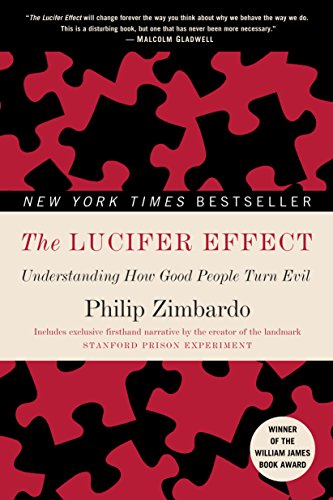“The Lucifer Effect” is a book that discusses the transformation of ordinary people into perpetrators of evil. This thought-provoking book by psychologist Philip Zimbardo has raised various ethical questions as it re-ignites the question of how good people are led to do bad things. The book revolves around the notorious Stanford Prison Experiment which Philip Zimbardo conducted in 1971. The book highlights how the situation and the environment can alter human behavior, leading to further violence, aggression, and suffering. In this blog post, we will explore the top 10 lessons from the book “The Lucifer Effect.”
“If you put good apples into a bad situation, you’ll get bad apples. If you put bad apples into a good situation, you’ll get good apples.”
Lesson 1: Attitude and Behavior
Attitude and behavior are the two main features that define human beings. The belief systems, values, and ethics shape the attitude, which, in turn, directs the behavior. However, this is not always the case. “The Lucifer Effect” highlights how changes in the setting and environment can make people disregard their beliefs and act out of character. Zimbardo saw that even the few prisoners who walked in with strong morals were forced to forfeit their moral compass due to the disturbing living circumstances.
It is important for individuals and institutions to keep this in mind and create healthy environments that cater to the well-being of both the staff and the people in their care. It is also critical to remain cautious as warped environments can lead to severe mental trauma, such as PTSD, stress, and other psychological issues.
Lesson 2: Obedience
Obedience is crucial in any situation that requires a chain of command – be it military or civilian. Still, the book has raised concerns as to how far people will follow authority even when the results are morally wrong. This is what Zimbardo wanted to show by the power dynamic in the prison experiment. The guards started gaining degrees of authority and used their newfound power to target the prisoners. Eventually, the behavior of the guards spiraled out of control as they succumbed to the abusive power they were granted at the start of the experiment.
Lesson 3: Group Identity
“The Lucifer Effect” also addresses group identity and its impacts on personal decisions. Groups and communities create a strong sense of belonging, and people usually go out of their way to protect the image of their group. This is familiar in the case of police brutality, where the police force may choose to protect a fellow officer, even when proved guilty of breaking the law. As much as it brings people together, group identity can also bring out the worst in people, particularly when they are pushed to separate themselves from people who don’t conform to the group’s ideals.
Lesson 4: Moral Disengagement
Moral disengagement refers to the process of rationalizing immoral behavior as a way of justifying it in one’s conscience. People become capable of committing immoral acts because their moral compass has been broken down, and they have no sense of responsibility to their actions. The guards in the prison experiment used moral disengagement to justify their cruel behavior towards the prisoners.
It is essential to establish a working environment where healthy morals and ethical behavior are encouraged, and morally disengaging employees is discouraged. The results of moral disengagement can be catastrophic and cause lasting damage to individuals and their supporting institutions.
Lesson 5: Deindividuation
Research shows that people are more liable to act out aggressively when they are not visible as individuals in a group. Group psychology plays into this, and the idea of the group over the individual contributes to this loss of self-identity. The prison experiment in “The Lucifer Effect” demonstrated how showing uniformity and anonymity through costumes can lead to unspeakable acts.
It is necessary to keep the idea of individuality in mind in groups of people, ensuring each individual feels responsible for their actions and not absorbed by the group’s goals.
Lesson 6: Power of anonymity
Anonymity can bring out the worst in people, and this was one of the outcomes of the experiments done in “The Lucifer Effect.” Anonymity has a way of shielding the bully from accountability, like the case of anonymous online trolls, who indulge in hate speech or make baseless claims.
Accountability in any situation is crucial as it restricts people from intentionally hurting others. Anonymity breeds toxicity and gives a false sense of power to the bully.
Lesson 7: Cognitive Dissonance
Cognitive dissonance occurs when our actions are not in line with our beliefs. Instead of changing our actions, we try to change our beliefs to make them seem like they coexist with the actions. For example, convincing yourself that smoking is harmless or that hateful speech towards an individual was justified. The prison guards in the experiment used cognitive dissonance to justify their wrongful acts.
Lesson 8: Self-justification
Self-justification is the mechanism whereby a person is obliged to convince himself and others that their actions were necessary and reasonable. The guards in the prison experiment used self-justification as a defense mechanism to validate their wrongful acts.
It is essential to identify when one is guilty of self-justification and address the cognitive dissonance. Individuals are also encouraged to think objectively and question their beliefs regularly.
Lesson 9: Conformity
Conformity is pervasive in society today. As much as it is acceptable, it can also be instrumental in allowing violent behavior towards certain groups or individuals. Understanding the potential of conformity to influence behavior is crucial in creating healthy and functional societies.
It is important to expose individuals to diverse environments to curb the social construct of conformity, which can result in wrongdoing.
Lesson 10: Personal Responsibility
Personal responsibility is fundamental in society, enforcing accountability on individuals’ actions. Individually, a person must control their actions to avoid wrongful acts that may tamper with their moral compass.
Conclusion
“The Lucifer Effect” explains the role situations and environments play in influencing human behavior. Reading the top 10 lessons from the book reinforces the need to remain conscious of our behavior and attitudes towards ourselves and other people. It is crucial that institutions, educators, parents, and caregivers ensure that the change in circumstances or environment remains healthy, functional, and ethical. With the knowledge gained from this book, we can build a better world that is not easily swayed to the dark side of human nature.

The Lucifer Effect: Understanding How Good People Turn Evil
Philip Zimbardo



